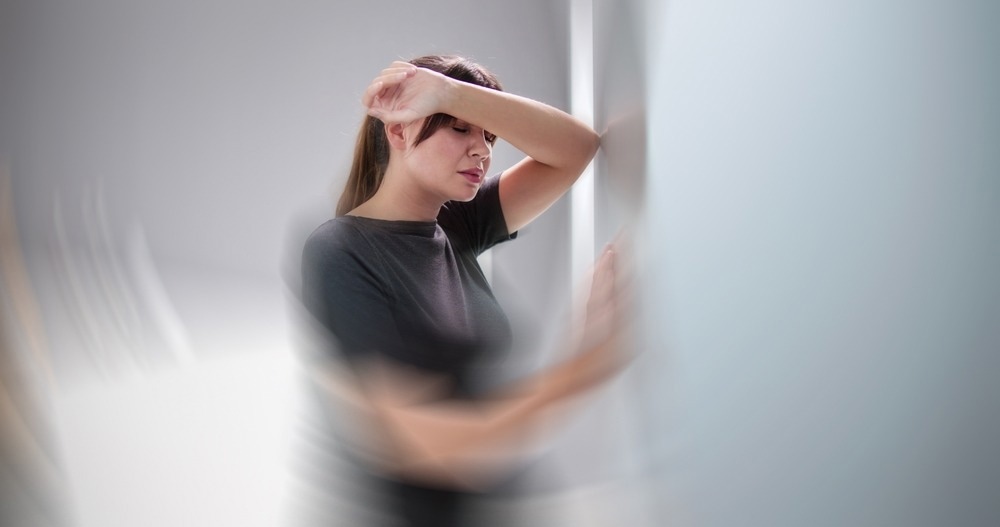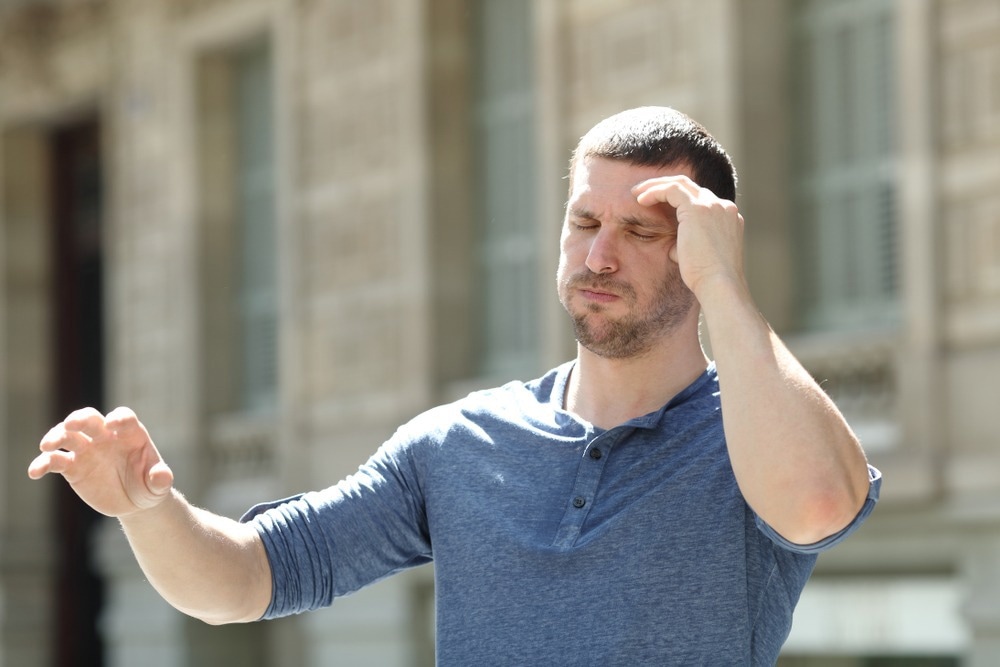Introduction
Understanding dizziness and balance issues
Common and benign causes
Serious underlying conditions
Diagnostic procedures
Personal stories
When to seek medical attention
Conclusion
References
Further reading
Introduction
Dizziness or balance problems can feel as though the room is spinning and can occur regardless of sitting, standing, or lying down.1 This symptom encompasses one of the most frequent patient complaints made in the neurological clinic, accounting for 5% of complaints in the outpatient clinic and 4% of complaints in the emergency department.2
The National Institute for Health and Care Excellence (NICE) estimated the prevalence varies widely according to the heterogeneity of ‘dizziness’ as a symptom, with dizziness having an estimated prevalence of 17-30% and true vertigo being found in 3-10% of the population.3

Image Credit: Andrey_Popov/Shutterstock.com
This article will focus on the potentially serious underlying issues that can cause dizziness and loss of balance.
Understanding dizziness and balance issues
A vestibular balance disorder can occur at any time but becomes more common with age.4
Dizziness and loss of balance are symptomatic of having a dysfunctional vestibular system, which plays a critical role in perceiving body motion and maintaining balance, as well as in postural and ocular motor control.2
The ear is a complex system comprising bone and cartilage with a critical network of canals called semicircular canals. These canals are filled with fluid, and with motion, the position of the fluid changes. Interestingly, a sensor within the ear sends information to the brain, which is attributed to an individual’s sense of balance. These components, along with other delicate pieces, construct the vestibular system.4
Various stimulants impact the signals from any part of the vestibular system, leading to symptoms such as dizziness and lack of balance.4
Symptoms of balance problems can include (i) a sense of motion or spinning, (ii) light-headedness, (iii) loss of balance, (iv) falling sensations, (v) dizziness, (vi) vision changes or blurriness, and (vii) confusion.1
Common and benign causes
Dizziness can be classified into various categories, including (i) vertigo, (ii) presyncope, (iii) light-headedness, and (iv) disequilibrium. However, the presentation of dizziness is not usually this clear, and patients typically find it difficult to determine their symptoms.5
Many different conditions can cause balance disorders, and some common and benign causes of sudden dizziness and loss of balance can include dehydration, low blood pressure, or minor infections.6,7
Dizziness can be an early indicator of dehydration, which is an imbalance of minerals, including salts and sugar, in the body. This can cause symptoms such as light-headedness, dry mouth, fatigue, dark and strong-smelling urine, or infrequent urination.6

Image Credit: Antonio Guillem/Shutterstock.com
Having low blood pressure, such as due to dehydration or other reasons, may cause dizziness or fainting, and finding out the cause of dizziness or low blood pressure for effective treatment is critical.7
Other causes of dizziness and loss of balance can include minor infections, including an inner ear infection that can impact hearing and balance, and this is called labyrinthitis.6
Serious underlying conditions
The etiology of dizziness can also be categorized into (i) central/neurologic, (ii) peripheral/vestibular, and (iii) cardiovascular causes.5
Central causes of dizziness consist of cerebellar or brainstem strokes or posterior circulation transient ischemic attacks (TIAs).5 A stroke can alter the way the brain controls balance, and this can lead to feelings of unsteadiness or uncoordinatedness.8
Peripheral causes comprise vestibular schwannomas, vestibular migraines, Meniere disease, benign paroxysmal positional vertigo (BPPV), bilateral vestibulopathy, or superior canal dehiscence syndrome.5
Meniere disease, which is rare and not fully understood, can cause intermittent hearing loss and buzzing, the feeling of fullness in the ear, and sudden and severe vertigo.1
BPPV can occur when calcium crystals within the inner ear, which aids in controlling balance, are dislodged from their normal position and move somewhere else inside the inner ear. This disorder is the most common cause of vertigo in adults and can cause a spinning sensation when turning in the bed.1
Cardiovascular causes can include orthostatic hypotension, presyncope, vertebral artery dissection, or dysrhythmias.5 These causes can result in decreased blood flow and can lead to light-headedness or the feeling of fainting.1
Diagnostic procedures
Diagnosing a patient who presents with dizziness or loss of balance may start with reviewing medical history and conducting a physical and neurological examination.1
The doctor may want to determine whether the symptoms are caused by problems in the balance function within the inner ear, with recommended tests including but not limited to (i) hearing test, (ii) posturography test, (iii) electronystagmography and videonystagmography, (iv) imaging tests, e.g., MRI or CT scan, and (v) blood pressure and heart rate test.1
The treatment of balance problems depends on the cause, and a fast and accurate diagnosis is necessary for effective treatment as it is important to determine if the cause is benign or malignant.5
Treatment may include vestibular rehabilitation, including balance retraining exercises, which can aid the patient in compensating for imbalance, adapting to having less balance and maintaining physical activity.1
Other treatment options may include positioning procedures, diet and lifestyle changes, medication, or even surgery.1
Personal stories
While dizziness or a loss of balance can be benign, there can also be a more serious underlying condition that requires investigation.9
Gillian shared her tumultuous experience with the Brain and Spine Foundation. Her dizziness started with an unresolvable bad cold, leading to a viral labyrinthitis diagnosis.9
Her persistent symptoms were exacerbated by long journeys and driving, continuing for five years, and various experimentation with anti-dizziness medication.9
Gillian stated she “almost died due to an infection in the blood that attacked her vestibular system.” Ultimately, she was diagnosed with meningitis and required a wheelchair due to being unable to stand because of her severe dizziness.9
After seeing an Ear, Nose, and Throat (ENT) surgeon and comprehensive tests, her vestibular system was found to be damaged. Gillian’s treatment included a vestibular rehabilitation program, and she also sought out treatment for migraine-associated vertigo and hopes to be able to walk independently and drive again in the future.9
When to seek medical attention
It is important to recognize when to call your healthcare provider, as although occasional light-headedness or dizziness can occur in most people if they are happening more frequently and impact quality of life, this may be a sign to seek medical help.4
Other signs to contact a general practitioner can include finding it difficult to hear or speak, experiencing tinnitus, double or blurred vision, numbness or weakness in the face, arms, or legs, changes in pulse, fainting, headaches, or feeling sick.6
Conclusion
If you experience any of the symptoms outlined in this article, seeking medical help is recommended. 6
Healthcare providers can perform investigational tests to determine the underlying cause of your dizziness or loss of balance and, if required, will be able to provide effective treatment management.1,6
References
- Balance problems. Mayo Clinic. June 18, 2020. Accessed May 12, 2024. https://www.mayoclinic.org/diseases-conditions/balance-problems/symptoms-causes/syc-20350474.
- Cao Z, Zhu C, Zhou Y, et al. Risk factors related balance disorder for patients with dizziness/vertigo. BMC Neurology. 2021;21(1). doi:10.1186/s12883-021-02188-7
- Vertigo: How common is it? Accessed May 12, 2024. https://cks.nice.org.uk/topics/vertigo/background-information/prevalence/#:~:text=Dizziness%20has%20an%20estimated%20prevalence%20between%2017-30%25%2C%20and,be%203%E2%80%9310%25%20%5B%20Murdin%20and%20Schilder%2C%202015%20%5D.
- Vestibular balance disorder. Johns Hopkins Medicine. November 19, 2019. Accessed May 12, 2024. https://www.hopkinsmedicine.org/health/conditions-and-diseases/vestibular-balance-disorder#:~:text=Dizziness%20and%20vertigo%20are%20symptoms%20of%20a%20vestibular,but%20are%20most%20common%20as%20you%20get%20older.
- Davis AJ. Evaluation of the Dizzy and unbalanced patient. StatPearls [Internet]. March 8, 2023. Accessed May 12, 2024. https://www.ncbi.nlm.nih.gov/books/NBK589645/.
- Dehydration symptoms and treatments. Accessed May 12, 2024. https://www.nhsinform.scot/illnesses-and-conditions/nutritional/dehydration.
- Low blood pressure (hypotension). Mayo Clinic. May 14, 2022. Accessed May 12, 2024. https://www.mayoclinic.org/diseases-conditions/low-blood-pressure/symptoms-causes/syc-20355465.
- Balance problems after stroke | stroke association. Accessed May 12, 2024. https://www.stroke.org.uk/stroke/effects/physical/balance-problems-after-stroke.
- Michel C. Gillian’s story: Brain & spine foundation. Brain Spine Foundation. January 10, 2023. Accessed May 12, 2024. https://www.brainandspine.org.uk/gillians-story/
Further Reading
Last Updated: Jun 19, 2024